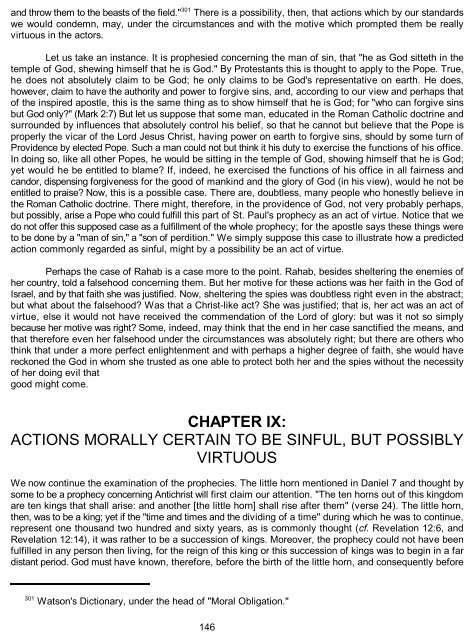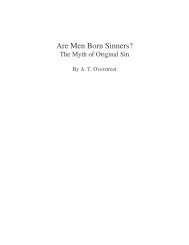Foreknowledge by Joel Hayes - Library of Theology
Foreknowledge by Joel Hayes - Library of Theology
Foreknowledge by Joel Hayes - Library of Theology
Create successful ePaper yourself
Turn your PDF publications into a flip-book with our unique Google optimized e-Paper software.
301<br />
and throw them to the beasts <strong>of</strong> the field." There is a possibility, then, that actions which <strong>by</strong> our standards<br />
we would condemn, may, under the circumstances and with the motive which prompted them be really<br />
virtuous in the actors.<br />
Let us take an instance. It is prophesied concerning the man <strong>of</strong> sin, that "he as God sitteth in the<br />
temple <strong>of</strong> God, shewing himself that he is God." By Protestants this is thought to apply to the Pope. True,<br />
he does not absolutely claim to be God; he only claims to be God's representative on earth. He does,<br />
however, claim to have the authority and power to forgive sins, and, according to our view and perhaps that<br />
<strong>of</strong> the inspired apostle, this is the same thing as to show himself that he is God; for "who can forgive sins<br />
but God only?" (Mark 2:7) But let us suppose that some man, educated in the Roman Catholic doctrine and<br />
surrounded <strong>by</strong> influences that absolutely control his belief, so that he cannot but believe that the Pope is<br />
properly the vicar <strong>of</strong> the Lord Jesus Christ, having power on earth to forgive sins, should <strong>by</strong> some turn <strong>of</strong><br />
Providence <strong>by</strong> elected Pope. Such a man could not but think it his duty to exercise the functions <strong>of</strong> his <strong>of</strong>fice.<br />
In doing so, like all other Popes, he would be sitting in the temple <strong>of</strong> God, showing himself that he is God;<br />
yet would he be entitled to blame? If, indeed, he exercised the functions <strong>of</strong> his <strong>of</strong>fice in all fairness and<br />
candor, dispensing forgiveness for the good <strong>of</strong> mankind and the glory <strong>of</strong> God (in his view), would he not be<br />
entitled to praise? Now, this is a possible case. There are, doubtless, many people who honestly believe in<br />
the Roman Catholic doctrine. There might, therefore, in the providence <strong>of</strong> God, not very probably perhaps,<br />
but possibly, arise a Pope who could fulfill this part <strong>of</strong> St. Paul's prophecy as an act <strong>of</strong> virtue. Notice that we<br />
do not <strong>of</strong>fer this supposed case as a fulfillment <strong>of</strong> the whole prophecy; for the apostle says these things were<br />
to be done <strong>by</strong> a "man <strong>of</strong> sin," a "son <strong>of</strong> perdition." We simply suppose this case to illustrate how a predicted<br />
action commonly regarded as sinful, might <strong>by</strong> a possibility be an act <strong>of</strong> virtue.<br />
Perhaps the case <strong>of</strong> Rahab is a case more to the point. Rahab, besides sheltering the enemies <strong>of</strong><br />
her country, told a falsehood concerning them. But her motive for these actions was her faith in the God <strong>of</strong><br />
Israel, and <strong>by</strong> that faith she was justified. Now, sheltering the spies was doubtless right even in the abstract;<br />
but what about the falsehood? Was that a Christ-like act? She was justified; that is, her act was an act <strong>of</strong><br />
virtue, else it would not have received the commendation <strong>of</strong> the Lord <strong>of</strong> glory: but was it not so simply<br />
because her motive was right? Some, indeed, may think that the end in her case sanctified the means, and<br />
that therefore even her falsehood under the circumstances was absolutely right; but there are others who<br />
think that under a more perfect enlightenment and with perhaps a higher degree <strong>of</strong> faith, she would have<br />
reckoned the God in whom she trusted as one able to protect both her and the spies without the necessity<br />
<strong>of</strong> her doing evil that<br />
good might come.<br />
CHAPTER IX:<br />
ACTIONS MORALLY CERTAIN TO BE SINFUL, BUT POSSIBLY<br />
VIRTUOUS<br />
We now continue the examination <strong>of</strong> the prophecies. The little horn mentioned in Daniel 7 and thought <strong>by</strong><br />
some to be a prophecy concerning Antichrist will first claim our attention. "The ten horns out <strong>of</strong> this kingdom<br />
are ten kings that shall arise: and another [the little horn] shall rise after them" (verse 24). The little horn,<br />
then, was to be a king; yet if the "time and times and the dividing <strong>of</strong> a time" during which he was to continue,<br />
represent one thousand two hundred and sixty years, as is commonly thought (cf. Revelation 12:6, and<br />
Revelation 12:14), it was rather to be a succession <strong>of</strong> kings. Moreover, the prophecy could not have been<br />
fulfilled in any person then living, for the reign <strong>of</strong> this king or this succession <strong>of</strong> kings was to begin in a far<br />
distant period. God must have known, therefore, before the birth <strong>of</strong> the little horn, and consequently before<br />
301<br />
Watson's Dictionary, under the head <strong>of</strong> "Moral Obligation."<br />
146






